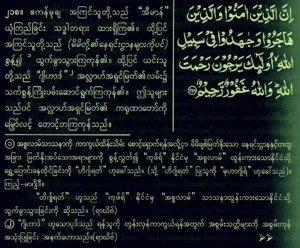Imagine if the ṣaḥābah (Companions) of Prophet Muhammad ﷺ were attempting to migrate today. Would OIC countries welcome them? Or might they be nudged instead toward strictly Christian nations?
This thought experiment exposes a troubling reality: OIC nations may not generously receive migrations—even of historic prophets and holy figures—while modern Christian-majority countries remain preferable contenders. Let’s unpack why—and what Ashura and the Qur’an teach us about migration in Islam.
1. What Is Ashura—And Why It Matters
In Sunni tradition, the tenth of Muharram—Ashura—commemorates multiple milestones:
- The parting of the Red Sea and Moses leading the Israelites.
- Noah disembarking from the Ark.
- God forgiving Adam, and Joseph emerging from prison.
It’s a day marked by gratitude, fasting, and remembrance of deliverance. By contrast, Shia Muslims commemorate Husayn ibn Ali’s martyrdom on Ashura, seeing it as a solemn day of mourning.
So Ashura deeply embeds migration and salvation themes—rescue from oppression and crossing thresholds into safe lands.
2. Emigration as Sacred Action
The Qur’an affirms emigration (hijrah) as righteous:
- “Lo! those who believe, and those who emigrate (to escape persecution) and strive in the way of Allah…” (Al-Baqarah 2:218)
- “Were not Allah’s earth spacious that you could have migrated therein?” (An-Nisa 4:97)
The Prophet ﷺ himself urged Muslims to relocate when oppression threatened their faith.
3. The Migration Challenge Today
Yet paradoxically, many Muslim-majority (OIC) countries actively restrict refugees—Muslims fleeing violence or persecution. Some forcibly refoule them or bar entry outright, even as they highlight “Islamic solidarity.”
Meanwhile, some non-Muslim, democratic nations—with no theological mandate—offer made pathways and protections. This contrast presents a perplexing irony: historic prophets and faithful Muslims once sought refuge in far-flung territories; today, many Muslim-majority countries are closing their doors.
4. Hypothetical: Would OIC Countries Welcome the ṣaḥābah?
Consider these scenarios:
- If Adam & Eve sought refuge from Cain, would they receive asylum in an OIC state?
- If Joseph fled persecution, would he be welcomed—or treated as undesirable?
- If Moses and the Israelites crossed into Islam-aligned lands, would they have walked unimpeded?
- If the ṣaḥābah migrated today, would they find sanctuary—or legal hurdles and suspicion?
Sadly, many modern examples show they’d likely face suspicion, bureaucracy, or refusal—contrary to core Islamic values.
5. Why This Contradiction Matters
Ashura and early Islamic tradition celebrated migration as part of a divine narrative of justice and mercy. Yet today, OIC nations often reject those who mirror such migration journeys—Muslim refugees and asylum seekers fleeing persecution.
This hypocrisy undermines the moral authority of these states. It contradicts the Qur’an’s guidance and the compassion exemplified during Ashura. Unless OIC countries realign policies with their spiritual heritage, they risk alienating vulnerable Muslims and betraying their own religious identity.
6. Conclusion: Revival of Islamic Principles Needed
- Ashura teaches us liberation—spiritual and geographic—is toward safety, justice, and dignity.
- Qur’anic teachings confirm migration as more than logistical; it’s an act of faith and resilience.
- Modern policy in many Muslim-majority countries tells a contrary story, neglecting Muslim refugees and prioritizing borders over bodies of faith.
If the ṣaḥābah were to migrate today, they might not find open arms in lands that now claim religious kinship. This disparity isn’t just political—it’s spiritual.
It’s high time Muslim-majority nations recall their emigration heritage—not as something locked in history, but as a living, breathing ethos. The true lessons of Hijrah and Ashura demand we restore compassion, open hearts, and open borders to those in need.
Sources for Deeper Reflection
- Qur’anic verses (Al-Baqarah 2:218; An-Nisa 4:97–99)
- Sunni & Shia interpretations of Ashura
- Hadiths about Hijrah & mercy for the emigrant
Let MMNN readers ruminate: How often do borders override belief? And who is accountable when compassion becomes conditional?
Islamic Migration Day Approaches: Why Are OIC Nations Rejecting Muslim Refugees?
Subtitle: Prophetic Migrations vs. Modern Hypocrisy
As Islamic Migration Day (1st Muharram) approaches, a painful irony emerges: OIC nations, bound by Islamic principles of refuge (Aman), are rejecting Muslim migrants fleeing persecution. If the Prophet’s companions (Ṣaḥābah) sought Hijrah today, would Muslim states welcome them? History suggests otherwise.
The Sacred Obligation of Hijrah
Quranic Mandate:
- “Whoever migrates for the cause of Allah will find refuge and abundance” (Qur’an 4:100).
- “Was not Allah’s earth spacious that you could have migrated?” (Qur’an 4:97) condemns those who abandon the oppressed.
- Asylum is obligatory for those fleeing injustice, persecution, or insecurity (Ibn al Arabi).
Islamic Law vs. OIC Actions:
- Islam mandates protection for all refugees—regardless of faith, gender, or wealth.
- Yet OIC states (e.g., Malaysia) raid refugee camps, detain asylum seekers, and close borders despite Myanmar’s civil war and crimes against humanity.
Ashura’s Lesson: Prophets as Refugees
On Ashura (10th Muharram), Muslims commemorate:
- Moses’ exodus across the Red Sea.
- Noah’s disembarkation from the Ark.
- Joseph’s release from prison.
- Adam’s forgiveness.
Irony: Today, these prophets would be turned away at OIC borders.
The Hypocrisy of Muslim Nations
- Malaysia: 82% of citizens demand closed borders (Ipsos poll); just 2% support welcoming refugees.
- ASEAN: Fails to protect refugees from Myanmar’s junta.
- Universal Betrayal: OIC nations demand justice for Myanmar’s crimes while arresting its refugees.
Islam’s Forgotten Compassion
Key Principles:
- Non-Discrimination: Asylum must be granted to Muslims and non-Muslims (Qur’an 9:6).
- Extra Protection: Women/children receive priority (Qur’an 4:2–9, 75).
- Collective Duty: Host societies are rewarded for generosity (Hadith: “The rights of migrants equal those of hosts”).
Modern Law vs. Sharia:
While the 1951 Refugee Convention excludes many, Islamic law (Hijrah) offers broader, unconditional refuge. Yet Muslim states ignore it.
Conclusion: A Call for Conscience
“All gods and Prophets were migrants once.” (Attributed to Dr. Ko Ko Gyi)
If prophets from Moses to Muhammad sought refuge today, OIC gates would slam shut. On Islamic Migration Day, we must confront this shameful contradiction: How can Muslim nations celebrate Hijrah while denying it to the oppressed?
— MMNN Opinion | Faith & Policy Section







